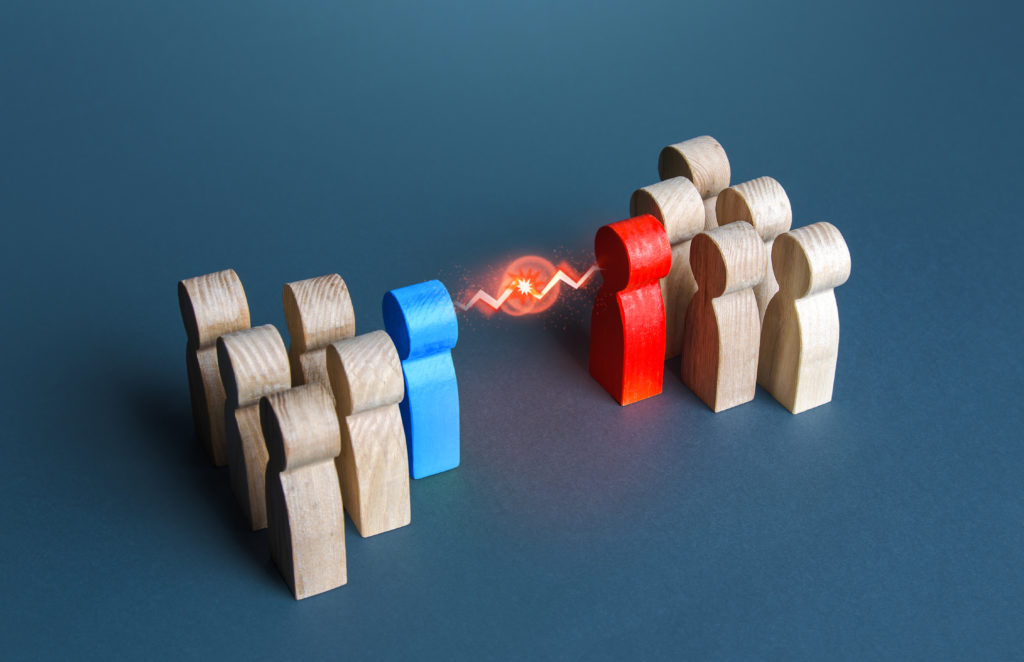Quick Hits
Daily brief research updates from the cognitive sciences

Us vs. them is known as in-groups vs. out-groups in psychology. This is the well-known effect of people being loyal to their own groups and being competitive and often aggressive to the out-group. This happens in multiple groups. Obvious ones are nationalities, religious groups, sports teams, but also geographical regions.
Previous research has shown that we human beings are very good at creating groups and this can be formed very quickly. We also know that these groups, at extreme levels, can be the cause of much of what we consider evil in society, aggression, abuse, murder, torture, and genocide. What may also be surprising, to some, is that all evidence points to this being hardwired i.e. babies as young as 3-months-old exhibit favouritism to in-groups and out-groups and this includes punishing the out-group and rewarding the in-group!
Now researchers at the Virginia Commonwealth University have investigated this effect further and come to some surprising, to some, conclusions!
What did they find?
They put 35 male college students through online competitive aggressive tasks. For this they told they would be competing with participants from a rival university. In fact, they competed against a computer – for ethical reasons. They had their brains scanned while doing these tasks.
What they found that was surprising is that those who were more aggressive against out-group members had greater activation of reward circuits in the brain suggesting that this is driven be reward rather than anger or other mechanisms. Specifically, the nucleus accumbens and ventromedial prefrontal cortex.
This reward circuitry was also associated with the mount they excluded the out-group from other activities. Though this has been measured in other contexts and the research points to this rewarding experience the researchers were most surprised by the strength of the effect in what is a “weak” out-group. A rival university is, in the big scale of things, not a very strong out-group such as the ones that are constructed in a divisive political atmosphere or on the global stage.
So sad to say that reward for punishing others seems to drive, to a large extent, in- and out-grouping and harming others. Fortunately, we now know this and fortunately not everybody exhibits this to excessive degrees●

Andy Habermacher
Andy is author of leading brains Review, Neuroleadership, and multiple other books. He has been intensively involved in writing and research into neuroleadership and is considered one of Europe’s leading experts. He is also a well-known public speaker speaking on the brain and human behaviour.
Andy is also a masters athlete (middle distance running) and competes regularly at international competitions (and holds a few national records in his age category).
Reference
Emily Lasko, Abigale C Dagher, Samuel James West, David Chester.
Neural Mechanisms of Intergroup Exclusion and Retaliatory Aggression.
Social Neuroscience, 2022
More Quick Hits
Don’t Try to Change Minds – Change Behaviour
Don’t try to change minds, but simply change behaviour is the result a group of researchers have come to with regard to vaccinations.
Why Heat Makes Us Sleepy
Imagine if you are working and your stress levels are increasing, and then automatically soothing music is turned on to calm you down. Or alternatively if you are heading towards that after lunch dip of drowsiness and upbeat energetic music is turned on to energise you.
Tracking Mental States Through Your Skin – In Real Time
Imagine if you are working and your stress levels are increasing, and then automatically soothing music is turned on to calm you down. Or alternatively if you are heading towards that after lunch dip of drowsiness and upbeat energetic music is turned on to energise you.
Testosterone Promotes Cuddling
Quick HitsDaily brief research updates from the cognitive sciences es, you read the headline correctly. Testosterone considered the ultimate male hormone and often associated with aggression has had a bad rap. So, is all of this wrong? Well, the...
Online Learning Triggers Different Stress Responses
Quick HitsDaily brief research updates from the cognitive sciences ot so long ago all learning went online – out of necessity. There has been plenty pf research into differences in online learning and in-person learning but this study by Gellisch...
Use It Or Lose It – Mental Activity Reduces Dementia
Quick HitsDaily brief research updates from the cognitive sciences regularly write on which activities reduce risks of cognitive decline (just last week I reported on how your job can protect your mental abilites with age and also doing household...






